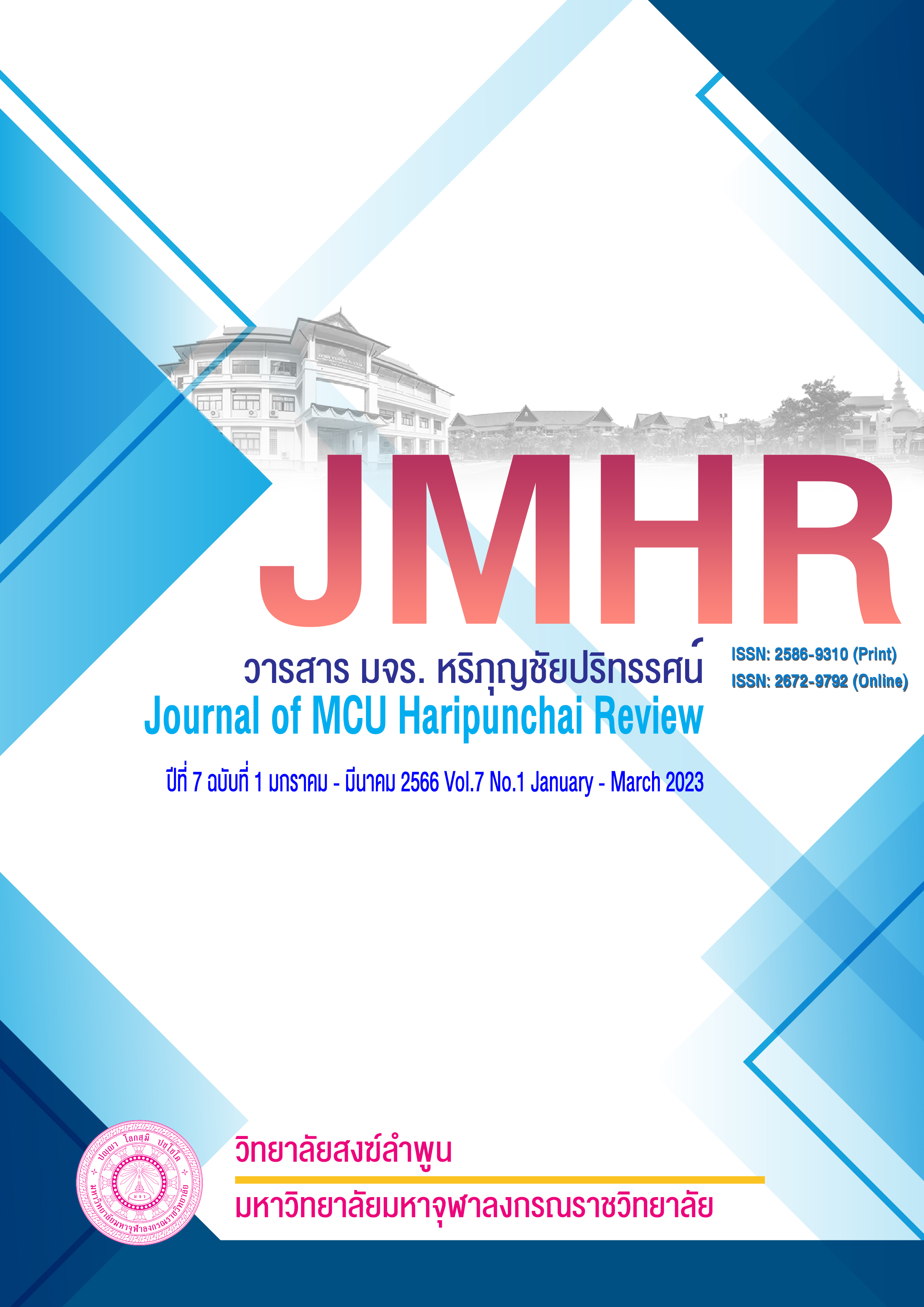Prapatsorn Chalothorn
Main Article Content
Abstract
This article aims to study “Western psychology” found that Western psychology that focuses on the mind. Is a state of consciousness or a state of consciousness In the 60th century, group psychologists were group behaviorism. Mental drive group Humanist Psychology and the Cognitive Psychology Group, which includes Carl G. Jung, Stanislaw Grove and Maslow, which outlines the broader concept and goals of mental development. And access to happiness that arises from mental development supported by 2 theories, namely positive psychology and transcendental psychology according to the reality of life and the world. Because the mind has a unique nature there is only one nature, abstract, unable to show any form. There must be an object that is born, has qualities, can be known or enlightened. As Western psychoanalysis philosophers call “psychology”, who believe that every behavior is a form of expression that is directed by the mind. Because the mind produces self-understanding modifying certain inappropriate behaviors of individuals with consciousness and insight to determine people's consciousness and behavior to be appropriate to the globalization trend. By applying it as an activity to set postures and create friendships of awakening is the main basis for the development of the mind itself.
Article Details

This work is licensed under a Creative Commons Attribution-NonCommercial-NoDerivatives 4.0 International License.
References
กันยา สุวรรณแสง. (2542). จิตวิทยาทั่วไป. กรุงเทพมหานคร: รวมสาสน์.
ณรงค์ เส็งประชา. (2530). มนุษย์กับสังคม. กรุงเทพมหานคร: โอเดียนสโตร์.
ดาริน ปฏิเมธีภรณ์. (2556). “แรงจูงใจในการปฏิบัติงานมีความสัมพันธ์กับประสิทธิภาพในการทำงานของพนักงาน บริษัท ขนส่งทางอากาศของเอกชนแห่งหนึ่ง ในกรุงเทพมหานคร”. สารนิพนธ์บริหารธุรกิจมหาบัณฑิต. บัณฑิตวิทยาลัย: มหาวิทยาลัยศรีนครินทรวิโรฒ.
เดโช สวนานนท์. (2518). จิตวิทยาสังคม. กรุงเทพมหานคร: โอเดียนสโตร์.
ปราโมทย์ เชาวศิลป์. (2526). คู่มือทฤษฏีจิตวิเคราะห์. กรุงเทพมหานคร: สหประชาพานิช.
ยศ สันตสมบัติ. (2542). ฟรอยด์และพัฒนาการของจิตวิเคราะห์ : จากความฝันสู่ทฤษฎีสังคม.กรุงเทพมหานคร : มหาวิทยาลัยธรรมศาสตร์.
รวิวงศ์ ศรีทองรุ่ง. (2542). การพูดเพื่อการประชาสัมพันธ์. กรุงเทพมหานคร: นานาสิ่งพิมพ์.
ลักขณา สริวัฒน์. (2545). สุขวิทยาจิตและการปรับตัว. กรุงเทพมหานคร: โอเดียนสโตร์.
วิจิตรภาณี เจริญขวัญ. (2551). ระบบและทฤษฏีทางจิตวิทยา. คณะศึกษาศาสตร์: มหาวิทยาลัยรามคำแหง.
วิธัญญา วัณโณ. (2556). “ทุนจิตวิทยาเชิงบวกในการทำงานกลุ่มของนิสิตนักศึกษา: การวิจัยและพัฒนาโมเดลการวัดและโปรแกรมเสริมสร้าง”. วิทยานิพนธ์ครุศาสตรดุษฏีบัณฑิต. คณะครุศาสตร์: จุฬาลงกรณ์มหาวิทยาลัย.
สาริศา สัสสินทร. ดาบตำรวจ หญิง. (2558). รูปแบบการสร้างภาวะตื่นรู้เชิงพุทธจิตวิทยาบูรณาการ. วิทยานิพนธ์พุทธศาสตรดุษฎีบัณฑิต. บัณฑิตวิทยาลัย: มหาวิทยาลัยมหาจุฬาลงกรณราชวิทยาลัย,
สิริพร วงษ์โทน. (2554). “ความสัมพันธ์ระหว่างทุนทางจิตวิทยาด้านบวก ความผูกพันต่อองค์การและผลการปฏิบัติงาน : กรณีศึกษาธนาคารพาณิชย์แห่งหนึ่ง”. วิทยานิพนธ์ศิลปศาสตรมหาบัณฑิต. บัณฑิตวิทยาลัย: มหาวิทยาลัยธรรมศาสตร์.
เสริมศิริ อัครพุฒิพันธ์. (2555). การพัฒนาเพื่อก้าวข้ามพ้นตัวตนตามแนวพระพุทธศาสนาเถรวาท. วิทยานิพนธ์พุทธศาสตรดุษฎีบัณฑิต. พระนครศรีอยุธยา : มหาวิทยาลัยมหาจุฬาลงกรณมหาวิทยาลัย.
อริยา คูหา. กาย จิต: ความสมบูรณ์แห่งชีวิต. วาครสารรูสมิแล. 30 (2). (พฤษภาคม-สิงหาคม) : 47-49.
________. (2554). จิตวิทยาเชิงบวก (Positive Psychology). วารสารรูสมิแล. 32 (3). (กันยายน –ธันวาคม) : 77-82.
อะริยา เลาหสุรโยธิน. (มปป.) วิชาจิตวิทยาร่วมสมัย. กรุงเทพมหานคร : มหาวิทยาลัยหอการค้าไทย.
Compton. William C. (2005). An Introduction to Positive Psychology. Wadsworth Publishing.
Harvey. P. (1995). The Selfless Mind: Personality. Consciousness and Nirvana in Early Buddhism. Surrey: Curzon Press.
Keith Campbell. (1938). Body and Mind. Notre Dame. Indiana : University of Notre DamePress.
Ken Wilber. (1995). Sex Ecology and Spiritual. Massachuselts: Shamphala Publication Inc.
Leahey. T.H. (2000). A History of Psychology: Main Current in Psychological Thought. (5th ed.). NJ: Prentice Hall.
Nandor Fodor. (1958). Freud : Dictionary of Psychoanalysis. New York: Philosophical Library. Inc.


